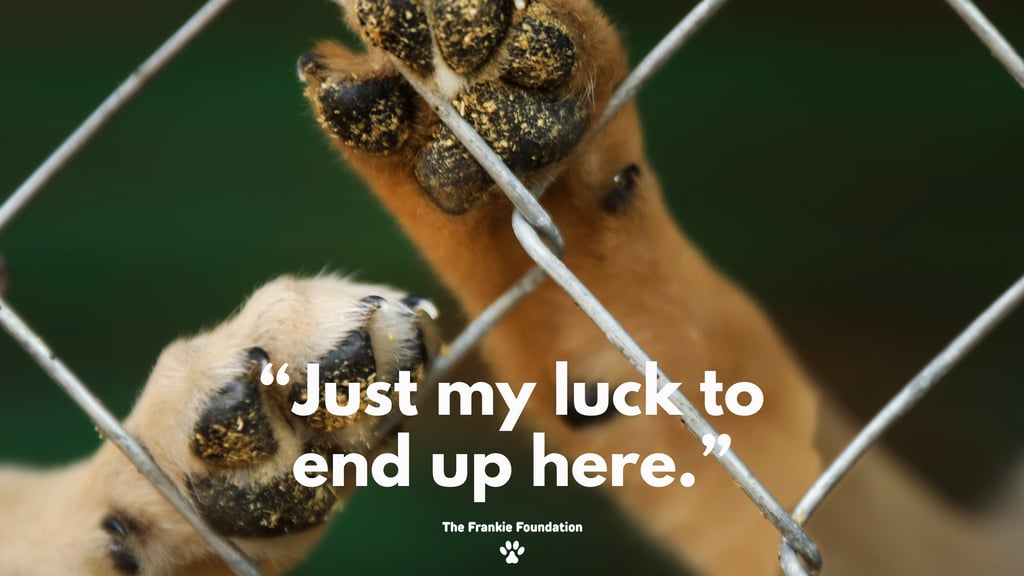Dedicated to Awareness
Entitlement
The Entitlement Problem Many facilities operate with entitlement—rejecting help, resisting scrutiny, and making decisions based on control rather than the animals’ best interests. This mindset keeps shelters full, progress stalled, and problems ignored. Sadly the entitlement helps them to justify it.
2/14/20256 min read


The Entitlement Problem in Animal Shelters: Who Gave You the Right?
One of the biggest, yet least discussed, issues in animal welfare is entitlement. Across the world, in substandard homemade facilities, too many people involved in rescue and sheltering believe that simply because they care about animals, they are qualified to control every aspect of their future. They set the rules, create barriers to adoption, and decide who is worthy of giving an animal a home—all without real accountability or reflection on whether their decisions actually help.
This isn’t about bad intentions. Most truly want to help. But wanting to help and actually helping are two very different things. Shelters are full, animals are stuck waiting for homes, and adoptions are made unnecessarily difficult—not because there aren’t willing adopters, but because those in charge feel entitled to dictate the process in ways that serve their own ideas rather than the animals’ best interests.
And yet, the elephant in the room—the one no one wants to acknowledge—is that these same shelters are scrutinizing everyone else while refusing to be scrutinized themselves. They question every potential adopter, every volunteer, every donor, and every outsider offering help. But when someone questions them, their policies, their failures, or their impact, the walls go up. They act above their station, immune to accountability while demanding total control.
Trying to Contact a Shelter? Prepare for a Journey Back in Time
If you’ve ever tried to get in touch with an animal shelter, you know it’s like stepping into a time machine. Many have no proper contact system, and if they do, it’s outdated or unreliable.
• Phones? Rarely answered.
• Emails? Maybe checked once a week/month. Replies delayed, or totally forgotten.
• Social media messages? Good luck getting a response—unless you’re criticising them or offering them some form of money or donation.
Meanwhile, their social media pages are filled with fluff and operated by an 'expert using Windows 98'—emotional posts, selfies with sad music, and vague statements about needing help—but rarely any concrete action plans and way too little in the way of animals for adoption. Comments asking for specific animals are met with, 'We don't have any.' Finish.
Their websites, if they even have one, are glorified 'donation stations', offering little more than a “donate here” button and an outdated “about us” page. Want to actually adopt an animal? You’ll be lucky to find anything resembling an easy process. After 26 clicks and redirects, you give up. If you don't you can eventually send an email, wait a month and then find out the animal is no longer available.
And if you try to get things moving—whether it’s adopting, volunteering, or collaborating—it’s like pulling teeth. Everything is slow, disorganized, and resistant to change. They want support, but only on their terms, in their way, and on their timeline.
Who Gave You the Right to Decide Who’s “Good Enough” to Adopt?
In many countries, adopting an animal is far more complicated than it should be. Shelters often operate with excessive scrutiny, making adopters jump through hoops that have no real justification. There’s an assumption that people need to prove they deserve a pet, rather than being guided toward a successful adoption.
• If someone works full-time? They don’t have time for a pet. The shelter is a better place.
• If someone doesn’t want to commit to home visits? They’re not responsible enough and they have no idea what this animal needs.
• If someone asks too many questions? They must not be sure about adopting. Probably clueless and will hand the animal back anyway.
• If someone wants a specific type of dog? They’re a nuisance and don't understand animals anyway.
And yet, the same places making these rules are packed with animals that have been waiting for years. They literally turn adopters away but then complain that the public isn’t doing enough. They claim to struggle financially but alienate donors and volunteers. They say they want adoptions, but their actions prevent them.
Who Gave You the Right to Control an Animal’s Future?
Here’s the reality: in most cases, shelters don’t receive animals because people believe they are turning to experts—they receive them because people have no other choice. Financial struggles, housing problems, or simply finding an abandoned animal often force people to hand animals over, not because they trust the shelter, but because there is nowhere else for them to go.
Yet, once the animal is in the system, the shelter takes full control of its fate—despite often lacking the skills, resources, or even the willingness to ensure the best possible outcome.
The original owner or rescuer, who may have had concerns or preferences for the animal’s future, is dismissed. Shelters have been known to immediately chip animals and then claim that they are now their property.
Opening times? Erm, no. Appointment only within the specified hours, usually mornings or lunchtimes during the week.
The general public, who could adopt and provide a loving home, is met with unnecessary barriers. Giving in data just to get the chance to look at the animals for adoption.
And the animal, caught in the middle, can end up spending years waiting for an adoption that may never come.
This is where entitlement becomes damaging. Many involved in sheltering act as if taking in an animal gives them absolute authority over its life. They create adoption policies based on personal biases, not best practices. They assume that anyone wanting to adopt must meet an impossible standard. They resist outside help, fearing that others might not do things their way.
And once again, the elephant in the room remains: if these people truly had the right skills, wouldn’t the shelters be empty? Wouldn’t adoptions be frequent? Wouldn’t the system work better instead of barely functioning?
Who Gave You the Right to Dismiss People’s Efforts? The Public Don't Work For You.
Entitlement in animal rescue isn’t just about adoptions—it’s about the entire culture. Many shelters and rescues reject outside help simply because it didn’t come from them. They make it difficult for volunteers to get involved, treat donors with suspicion, and ignore advice from experts in training, management, or marketing.
Even when they do accept donations, shelters often show too little gratitude—and in some cases, none at all. This entitlement mindset extends to their financial support: they expect help, but they don’t always offer the respect or acknowledgment that donors deserve. It’s as though giving money, time, or resources is expected rather than appreciated.
And then there’s the repeated line: “We’re so exhausted.” Well, no wonder. If they spent less time trying to control everyone and everything around them, they might find they had more energy to focus on what really matters—getting animals adopted and providing better care for those in their charge. But because they reject outside help, they end up trapped in their own cycles of control and exhaustion.
With Entitled People, You Can’t Win
If we were to say that shelters are great, they would be annoyed because we are recommending people take their animals there, which would put more pressure on them.
If we were to say that shelters aren’t great, they would be annoyed because we are picking on them.
So what do we do? We simply don’t recommend them. And even that will be seen as an attack. Because with entitled people, you can’t win.
Will Saying This Change Anything?
Probably not. The people who need to hear it the most won’t listen. They’ll dismiss it as negativity, claim it’s unfair criticism, or say “we’re just doing our best.” And that, ironically, is exactly the problem. The refusal to even consider a different approach only reinforces the entitlement that’s keeping animals trapped in shelters for years.
But the bigger question many will ask us is: Will you saying this create more issues for the animals?
How could it? Why would it?
If simply pointing out these problems somehow leads to animals suffering more than saying nothing at all does, then that alone proves something is deeply wrong. It would mean that shelters and rescues are so focused on themselves that they are willing to make things worse for the animals just to spite those who challenge them. We've seen it. We are proof. We have been banned for speaking out and are now unable to help the animals stuck behind fences. If that's not about entitlement, then what is?
If constructive criticism is met with defensiveness rather than reflection, that is not a system built around helping animals—it’s a system built around protecting egos.
Entitlement Is Killing Progress in Animal Welfare
Until entitlement is removed from the equation, shelters will remain full, adoptions will remain difficult, and the very people who claim to be helping animals will be the ones standing in their way.
And the elephant in the room? It will still be there, growing larger with every missed adoption, every rejected volunteer, and every animal who could have been in a loving home but wasn’t—because entitlement got in the way.






The Frankie Foundation
+49 1512 1603288
frankiefoundationalgarve@gmail.com
Tavira, Algarve, Portugal.


Copyright The Frankie Foundation 2025
